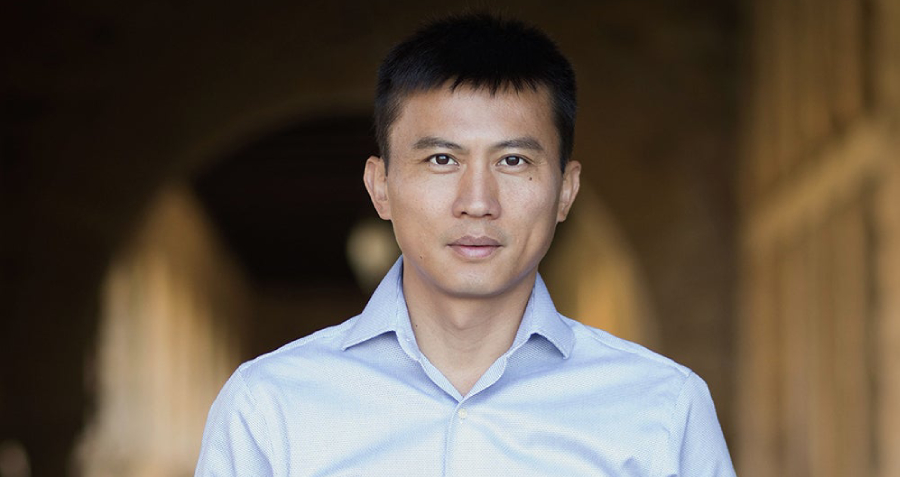As artificial intelligence reshapes industries worldwide, its impact on clean energy and sustainability could be transformative, according to Dr. Yi Cui, Fortinet Founders Professor at Stanford University and a pioneering researcher in materials science and energy storage.
In an interview coinciding with his participation in the upcoming Global Unicorn Program: Scaling for Success in the Age of AI jointly offered by Stanford Engineering and CKGSB, Cui shared his perspectives on how AI is revolutionizing energy innovation and accelerating the transition to sustainable technologies.
“AI is a foundational technology that impacts every field of development,” notes Cui. In materials science, AI can dramatically accelerate the discovery of new materials by analyzing vast databases of compositions and properties to predict optimal combinations for specific functions.
For energy storage devices such as batteries, AI helps in several ways – from optimizing performance parameters to managing charging systems. “AI can help with battery R&D, finding the right parameter space, making batteries better and better,” Cui says. At the system level, AI could help integrate renewable energy sources, manage grid stability, and optimize electric vehicle charging patterns.
One particularly promising application involves battery management systems. AI can monitor battery health conditions and optimize charging patterns to prevent damage and extend battery life. For electric vehicles, AI could help determine which parts of the battery pack should be used for power output, rather than drawing uniformly from the entire pack.
The integration of renewable energy sources presents unique challenges that AI is well-positioned to address. “Solar and wind are not stable sources of energy. You need to stabilize that storage in the batteries put into the grid,” Cui notes. “This grid demand, with all these variations in weather conditions, is very complex. AI will be able to help design systems to be stable.”
For entrepreneurs looking to commercialize tech innovations in clean energy, Cui emphasizes the importance of understanding market fit alongside technical feasibility. “To commercialize in the clean energy sustainability space is a big challenge,” he notes. “Even if it works to commercial specs with performance advantage, your cost needs to be low enough, your manufacturing needs to be figured out.”
Cui advises careful analysis of target markets, whether utility-scale or distributed residential systems, and consideration of manufacturing scalability and supply chain robustness. The current geopolitical environment adds another layer of complexity to cross-border commercialization.
Success requires navigating multiple challenges simultaneously: proving that the technology works at commercial scale, achieving competitive costs, establishing manufacturing processes, and ensuring market demand. “Some people have technology, and they want to push it to the market, but it might not be the right fit,” Cui warns. “You also have to look at what’s needed for analyzing the market.”
Looking at the broader climate crisis, Cui sees significant potential for AI to support mitigation efforts. AI could improve extreme weather prediction and help plan emergency responses. More importantly, it could support countries in planning their clean energy transitions by analyzing current energy infrastructure, available resources, and optimal pathways to decarbonization.
“With AI, we could plan for one country, or maybe even a continent, in a very effective way,” Cui notes. “One country could be thinking about this in one way, while another country could have a very different pathway. We can use human intelligence to do that, and it could work in parallel with artificial intelligence to help.”
The potential applications extend beyond planning to real-time management of energy systems. Cui cites the example of California’s response to extreme heat conditions, where text messages were sent asking residents to reduce air conditioning use to prevent grid collapse. In the future, AI systems could automatically manage such situations, though cybersecurity concerns would need to be carefully addressed.
Infrastructure and Investment
The clean energy transition requires massive infrastructure investment, from power grids to charging networks. AI could play a crucial role in streamlining the notoriously complex permitting processes that often delay clean energy projects. As Cui explains, the challenge is multi-layered – regulations vary not just between countries but also between states and local jurisdictions. Each level may have different requirements for environmental impact assessments, safety standards, and technical specifications. AI systems could potentially analyze these diverse regulatory frameworks, automatically check compliance, and even predict approval timelines based on historical data. “Maybe a general AI could just go in and say, ‘This is how you should be doing it, because of these policies and regulations,'” Cui suggests. “Instead of taking six months, maybe AI could look at the drawings, the designs, and the required documentation, and say within seconds whether this satisfies requirements to get the permit.” This acceleration of administrative processes could significantly reduce project timelines and costs, making clean energy infrastructure development more efficient and economically viable.
“Institutional investors don’t know whether certain technologies are ready or not to be invested in,” Cui explains, referring to investors’ challenges with emerging technologies. While they’re comfortable with established markets like solar PV, newer technologies require extensive expert consultation. AI could potentially provide initial analysis, though human expertise will likely remain crucial for final investment decisions.
Scaling Cleantech Startups with AI
For entrepreneurs looking to scale their clean technology startups, AI offers powerful tools across multiple business functions. “The domain knowledge is critical,” Cui notes. “Getting a general AI to be good at everything is very hard. You need to go to a vertical domain with further training – this is where the huge opportunities lie.”
In research and development, AI can accelerate product iteration by analyzing test data and predicting performance outcomes. For manufacturing, AI systems can optimize production processes, reduce waste, and maintain quality control. On the business side, AI can help identify market opportunities, streamline customer acquisition, and improve supply chain management.
However, Cui cautions against over-reliance on AI without strong domain expertise. “A general AI may not be good at everything – I think it’s very hard,” he notes. “By having a base, you actually need to go to a vertical domain. When companies’ platforms and large models are applied to a domain with further training, the opportunity is huge.”
Fundraising is another area where AI could provide advantages. While venture capitalists don’t yet rely on AI for making investment decisions, Cui suggests AI could help startups better prepare their pitches by analyzing market data, competitive landscapes, and potential growth trajectories. “They might rely on AI to collect some information, to see what AI thinks first,” he notes regarding investors’ approach.
The key to successful scaling, according to Cui, lies in finding the right balance between AI capabilities and human expertise. AI can handle data-intensive tasks and pattern recognition, freeing up human capital for strategic decision-making, relationship building, and innovation. This is particularly important in the clean tech sector, where technical complexity meets regulatory challenges and market uncertainties.
Successful examples are emerging across the industry. Companies are using AI to optimize renewable energy forecasting, improve battery management systems, and enhance grid integration. Others are applying AI to improve customer engagement and streamline installation processes for solar and other clean energy solutions.
Cui sees particular promise in combining AI with Internet of Things (IoT) sensors and edge computing to create more intelligent and responsive clean energy systems. This could enable real-time optimization of energy distribution, predictive maintenance of infrastructure, and more efficient resource allocation across the grid.
Opportunities and Risks
While acknowledging AI’s transformative potential, Cui also emphasizes the need to address risks, particularly around cybersecurity when AI systems control critical infrastructure. He notes that the current AI boom has drawn some attention and resources away from clean energy startups, creating both challenges and opportunities.
“Oftentimes, this is the best time to start a new company, when the market is tough,” Cui notes. “Then when the market becomes big, you can start to fly.” The combination of higher interest rates and shifting investment patterns means clean energy startups need to be especially careful with capital management.
As Director of Stanford’s StorageX Initiative and a pioneer in battery technology, Cui will share these insights and more with participants in the Global Unicorn Program. The program aims to help entrepreneurs and executives navigate the intersection of AI and clean technology, combining insights from both Eastern and Western innovation ecosystems.
Cui’s research reflects the intersection of advanced materials, energy storage, and computational innovation. With more than 500 publications and numerous breakthrough discoveries in battery technology and materials science, his work continues to shape the future of sustainable energy systems.
The synthesis of AI capabilities with domain expertise in clean technology could accelerate the path to sustainable energy solutions. However, success will require careful navigation of technical, market, and regulatory challenges.




















